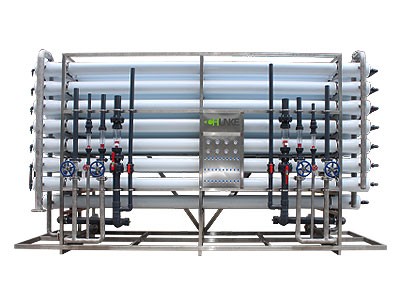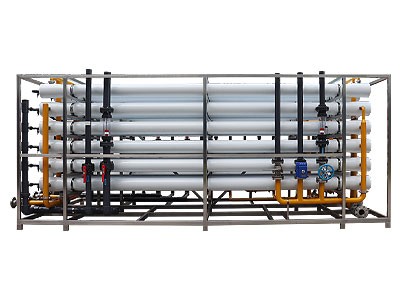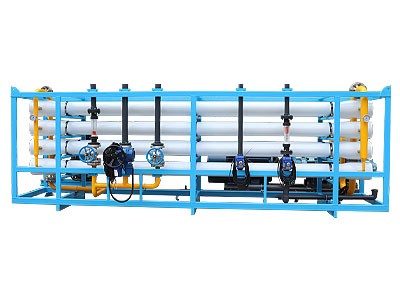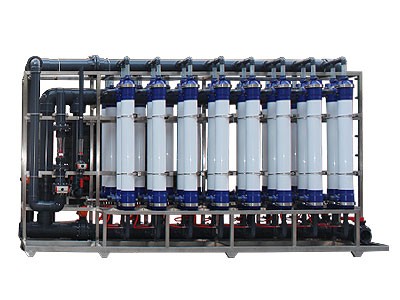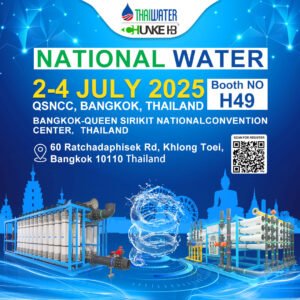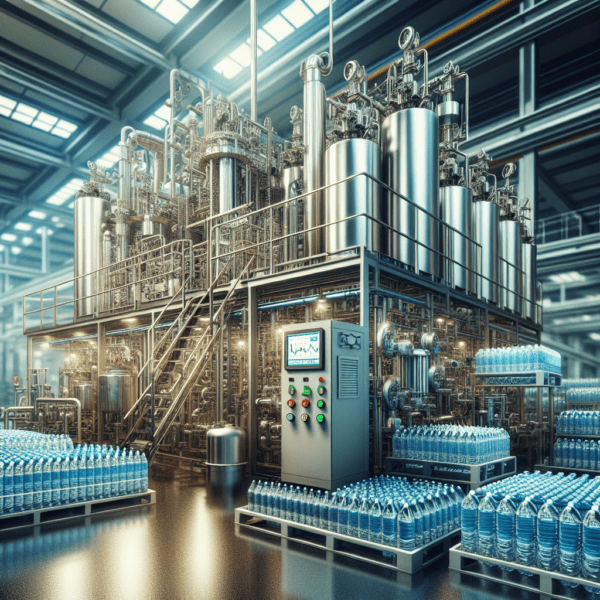
Mineral water plant cost: Establishing a mineral water plant is a lucrative venture that demands practical planning and a detailed understanding of the mineral water plant cost. Given the rising demand for purified drinking water, knowing how to start a water bottle company has become more vital than ever. This venture not only requires an understanding of the water purification process but also a deep dive into the costs associated with water treatment equipment and the sourcing of a reliable water source. With the health consciousness of consumers on the rise, the demand for mineral water has never been stronger, making this the perfect time to delve into this industry.
Our guide will navigate you through the critical steps to estimate the mineral water bottle plant cost accurately, focusing on essential elements such as water treatment equipment, including reverse osmosis systems and ultrafiltration systems, and the engagement of services from top manufacturers like Chunke Water Treatment. We will also explore the costs related to bottling and labeling equipment, packaging materials, water quality testing equipment, and transportation and delivery vehicles. Understanding these components will not only help in estimating mineral water plant costs but also in setting up a successful operation that ensures the highest quality of drinking water for your potential customers.
Startup Costs
In our journey to establish a mineral water plant, understanding the startup costs is crucial. We will break down these costs into three main categories: Land Lease, Building Construction, and Machinery and Specialized Equipment.
Land Lease
The cost of leasing land for a mineral water plant can vary significantly based on location and lease duration. Typically, monthly lease rates can range from a few hundred to several thousand dollars. For a more extended lease, such as a 3-year term, upfront costs could be between $20,000 and $80,000.
Building Construction
Constructing the facility for a mineral water plant involves various expenses, crucial for ensuring a space that supports safe and high-quality water production. Here are some average costs you might encounter in the U.S for mineral water plant cost calculation.:
- Foundation: $10-15 per square foot
- Excavation: $15-20 per square foot
- Walls and Floors: $10-15 per square foot
- Roofing: $5-10 per square foot
- Utilities Installation: $30-50 per square foot
- Finishing: $5-10 per square foot
These figures illustrate the importance of budgeting accurately for construction to avoid unforeseen expenses.
Machinery and Specialized Equipment
The machinery and equipment for a mineral water plant form a significant portion of the startup costs. The cost varies depending on the plant’s size and technological needs. Basic setups might include pumps, filters, tanks, and labeling machines, costing as low as $3,000. However, for larger-scale operations requiring advanced technology like reverse osmosis systems or ozone generators, costs can soar up to $5,000,000. Specifically, a reverse osmosis water treatment system might cost between $50,000 and $300,000.
Additionally, the installation of essential utilities and systems such as electricity, water, ventilation, and wastewater management is necessary to support the equipment and production processes. Proper installation and debugging of these systems can cost between $15,000 and $25,000, ensuring flawless operation and compliance with production standards.
By understanding these detailed costs associated with land leasing, building construction, and machinery, we can better prepare for the financial investment required to launch a successful mineral water plant. Furthermore, engaging with top manufacturers like Chunke Water Treatment, renowned for their expertise in water treatment systems, can ensure that we equip our plant with the best technology available.
Water Treatment Equipment
Basic Water Treatment
In our mineral water plant, the water treatment process begins with the basic yet crucial steps necessary to prepare the raw water for further purification. Initially, the raw water is stored in a Raw Water Tank, allowing for any heavy sediments to settle. This is followed by a series of filtration steps: Sand Filters are used to remove suspended solids down to 20 microns, and Activated Carbon Filters absorb chlorine, odors, and organics from the water. Additionally, a Water Softener is employed to replace hardness minerals with sodium to prevent scale formation in the piping and machinery.
To calculate the mineral water plant cost please use Chunke Water Treatment Mineral Water Cost Calculator.
Advanced Water Treatment
As we progress to more sophisticated purification, the water undergoes micron filtration, removing particles down to 5 microns. The core of our advanced treatment is the Reverse Osmosis System, which effectively eliminates dissolved salts and minerals. Following this, UV Disinfection is utilized to ensure any remaining microorganisms and pathogens are eradicated, guaranteeing the safety of the water. The treated water is then stored in a Treated Water Tank, ready for the bottling process.
Maintenance Costs
Operating a mineral water plant incurs various maintenance costs that are essential for continuous and efficient operation. These include the costs associated with the regular replacement of membranes and filters, which can range from $3,000 to $10,000. Additionally, energy consumption for running the plant machinery, particularly the high-energy reverse osmosis system, typically ranges from $8,000 to $25,000 per month. Labor costs for plant operations and maintenance also form a significant part of the expenses, generally ranging from $15,000 to $40,000 per month.
Furthermore, our commitment to ensuring the highest quality of water involves substantial investment in water quality testing equipment and chemicals for water treatment. These costs can vary from $4,000 to $15,000 per month for chemicals and from $10,000 to $30,000 for quality control and laboratory testing. Lastly, the costs for waste disposal and sludge management, essential for environmental compliance, typically range from $5,000 to $15,000.
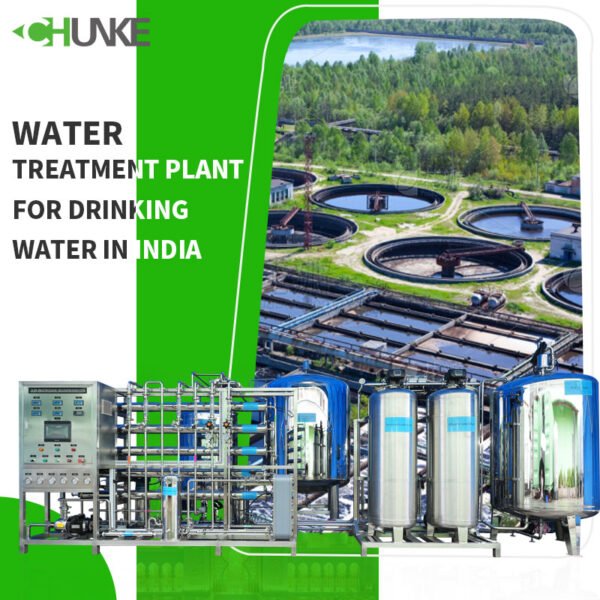
Bottling and Labeling Equipment
Cost Range
In the realm of mineral water bottling plants, the financial outlay for bottling and labeling equipment can be substantial, reflecting the sophistication and capacity of the machinery involved. The cost of bottling equipment alone can range from $50,000 to $750,000, depending on the scale and automation of the plant. This includes essential components such as filling machines, conveyors, labelers, and capping machines, all tailored to meet the specific production requirements of the facility.
Labeling equipment, which is crucial for brand presentation and regulatory compliance, also represents a significant investment. Costs for these machines can vary from $10,000 to $100,000, influenced by the complexity of the tasks they perform and the speed at which they operate. These systems may include advanced features like printers and label applicators, necessary for applying labels accurately across different bottle sizes and shapes.
Custom vs. Standard Equipment
Choosing between custom and standard bottling and labeling equipment hinges on the specific needs and aspirations of the mineral water bottling plant. Standard equipment might suffice for smaller operations or those with less complex requirements. However, larger facilities or those aiming for a broader market reach might find that custom solutions, which can be tailored to fit unique production lines and handle a diverse array of bottle types, are a more apt choice.
The level of customization can significantly affect the cost. While off-the-shelf solutions might be more cost-effective initially, customized equipment can offer greater flexibility and efficiency, potentially leading to long-term savings in terms of reduced waste and downtime. Furthermore, custom equipment can be designed to integrate seamlessly with existing production processes, enhancing overall productivity and ensuring consistency in product quality.
Investing in high-quality, reliable bottling and labeling equipment from reputable manufacturers like Chunke Water Treatment ensures that the mineral water bottling plant is equipped with efficient and durable solutions. This not only aids in maintaining operational continuity but also supports the plant’s commitment to delivering a high-quality product to the market.
Packaging Materials
Bottle Costs
In the realm of mineral water production, the cost of packaging, particularly bottles, plays a significant role in the overall expenses. The average plastic bottle of water costs $1.29, with the actual water costing less than $0.00001. The bulk of the price is attributed to the production of the plastic bottle, including aspects such as packaging and marketing. It’s crucial to note that while plastic bottles are a common choice due to their convenience and cost-effectiveness, they pose significant environmental challenges. Approximately 91% of plastic isn’t recycled, leading to substantial pollution in our oceans and landfills.
Cap Costs
Caps are an essential component of bottled water packaging, ensuring the product’s integrity and safety. The pricing of caps can vary based on the quantity purchased and the type of cap required. For instance, water bottle sport caps, which are commonly used for their convenience, are priced differently based on the volume of the order. Prices range from $0.19 each for small quantities to as low as $0.08 each for orders of 2000 or more. This tiered pricing structure allows businesses to benefit from economies of scale, reducing the per-unit cost with larger orders.
Box Costs
The cost of boxes for packaging also varies depending on the material used and the quantity ordered. The pricing of packaging is not only influenced by the cost of materials but also by the value of the product being packaged. For example, the same type of cardboard packaging can vary several times in price when used for different products like chocolates, perfumes, or bank VIP cards, ranging from 5% to 30-40% of the product’s cost. This variability highlights the importance of selecting the right packaging materials that align with both budget constraints and marketing objectives.
In conclusion, understanding the detailed costs associated with bottles, caps, and boxes is crucial for effectively managing the expenses in a mineral water plant. By considering these factors, businesses can make informed decisions that balance cost-efficiency with environmental responsibility and market requirements.
Transportation and Delivery Vehicles
Cost of Trucks
In our endeavor to set up a mineral water plant, we need to consider the costs associated with transportation and delivery vehicles. Water trucks, essential for the delivery of large water quantities, consist of a driver’s rig, a water tank, and pumping equipment with spray nozzles. These tanks vary in size, holding anywhere between 500 to 5,000 gallons of water. For instance, the Load King models that we utilize include a 2,000-gallon tank priced and designed differently from the 4,000-gallon model due to its capacity and dimensions. The larger tanks, like the Load King 4,000 gallon, measure significantly more in length and width, which impacts the cost and operational handling.
Maintenance and Additional Costs
Maintaining these trucks is crucial for ensuring efficient operations and safety. The trucks feature advanced pumping systems like the Berkeley style pump, which is standard on Load King water trucks and performs both suction and discharge. This system, along with strategically placed baffles inside the tank, helps in minimizing water surges and maintaining the truck’s stability, especially during transportation.
Additional costs include safety measures and operational protocols. For example, to prevent accidents due to oversaturation of water around the truck, it’s advised to manage the spray outputs carefully. Also, trucks with rounded water tanks should not be filled to capacity as it can make the vehicle unstable on roads. Pre-use warming up of trucks is recommended to build sufficient air pressure for the vacuum brakes.
From a financial perspective, the average monthly cost for water delivery services can range from $30 to $50 for households and around $125 for a company with 10-20 employees, which varies based on several factors including the amount of water used and the location. Additionally, water delivery fees can be influenced by the distance traveled and the number of bottles delivered, with strategies like scheduling less frequent but bulk deliveries helping to reduce costs.
In conclusion, understanding the detailed costs associated with the purchase, operation, and maintenance of water delivery trucks is essential for managing overall expenses in a mineral water plant. By leveraging efficient trucks and optimizing delivery schedules, we can ensure cost-effective operations while maintaining high standards of service and safety.
Conclusion
Throughout this guide, we’ve meticulously charted the terrain of establishing a mineral water plant—right from the initial stages of leasing land and constructing the necessary facilities to the final steps involving the selection of sophisticated water treatment equipment furnished by industry leaders like Chunke Water Treatment, the best manufacturer in China. The complex interplay of costs spanning equipment, packaging, and transportation has been unraveled, providing a blueprint for aspiring entrepreneurs to embark on this journey with clarity and confidence. The guide emphasizes the cruciality of choosing top-notch equipment and partnership, akin to that with Chunke Water Treatment, to ensure the highest standards of quality and efficiency in the water purification process.
Reflecting on the broader implications, it becomes apparent that the success of a mineral water plant hinges not just on the technology and processes employed but also on the strategic foresight in managing and optimizing operational costs. Importantly, the environmental considerations and the push towards sustainability underscore the need for innovation and responsible sourcing, especially in choosing materials for bottles and packaging. As we venture into this promising yet challenging industry, the guidance from seasoned manufacturers like Chunke Water Treatment can provide a much-needed edge. For those seeking further insights or to explore collaborations, feel free to send us email or call us +86 166 1663 6489 (Whatsapp/Wechat), ensuring you’re well-equipped to navigate the complex yet rewarding venture of launching a mineral water plant.
FAQs
1. What is the estimated cost to construct a new water plant?
The initial cost estimates for building a new water plant typically range between $35 million and $50 million. This total can vary based on several factors, including the possible need to buy water from nearby communities during the construction phase.
2. What are the financial requirements to start a bottled water business?
Starting a bottled water company generally requires an investment ranging from $500,000 to $1.5 million. The exact amount depends on the scale and type of business you plan to establish.
3. How much does it cost to produce water commercially?
For the fiscal year ending December 31, 2023, American Water reported production costs of $438 million, which included $161 million spent on purchasing water.
4. What is the investment needed to establish a mineral water plant in Pakistan?
To set up a Mineral Water Processing Unit in Pakistan, the total estimated cost is around PKR 300,000. This includes PKR 200,000 in capital expenditures.

